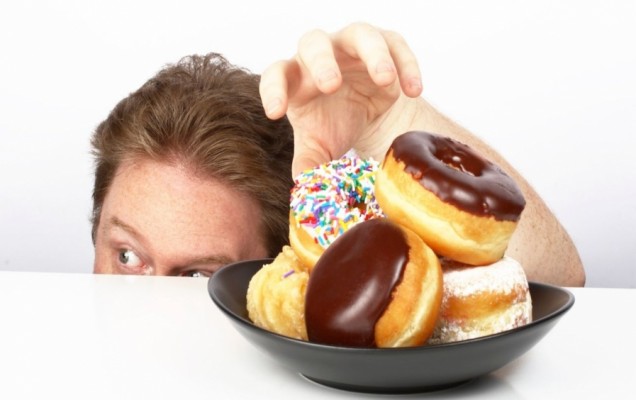
When the Brain Craves Sweets: A Call from the Body or a Trick of the Mind
Barekat Health & Pharmaceutical Group: Imagine a typical day, perhaps around midday, when an unexpected craving for something sweet—be it a delectable pastry, a piece of chocolate, a slice of cake, or even a glass of sugary beverage—suddenly arises. How familiar does this sensation feel? One might assume this yearning stems from a simple need for energy or a drop in blood sugar levels. However, the underlying reality is far more intricate and intriguing.
Craving sweets is a complex interplay of psychological and physiological phenomena, where the brain and body engage in a sophisticated dance. This sudden and intense desire for sugary foods is not merely a response to energy deficiency; it is deeply rooted in neural and hormonal activities within the brain’s reward system. Upon consuming sweet treats, the brain releases a neurotransmitter known as dopamine, which is responsible for the immediate feelings of pleasure and satisfaction. Yet, frequent and excessive intake of sugar can diminish the brain’s sensitivity to dopamine, potentially leading to a cycle of dependency. Moreover, psychological factors such as stress, behavioral habits, sleep deprivation, and even genetic predispositions significantly influence the intensity and frequency of these cravings.
In this report, we aim to delve into the scientific and analytical aspects of sugar cravings, exploring their origins, distinguishing them from genuine hunger, understanding the role of dopamine, hormonal cycles, and strategies to manage these intense urges. Our goal is to comprehend and control this phenomenon more effectively.
Why is Craving Sweets More Than Just Hunger?
True hunger is a physiological response to the body’s need for energy, typically manifesting gradually and logically. In contrast, craving sweets is a psychological and neurobiological need that emerges suddenly and intensely, often focusing on a specific type of food—sugar and sweets. These cravings originate from particular areas in the brain associated with the reward system and pleasure sensations.
These brain regions activate upon sugar intake, providing an immediate sense of satisfaction. Therefore, craving sweets is less about addressing actual energy deficits and more about seeking a pleasurable experience that the brain desires to repeat. Consequently, even after consuming a full meal, the urge for sweets may resurface, not due to true hunger but because of this underlying desire.
Dopamine: Golden Key in World of Sweet Cravings
Dopamine is a crucial neurotransmitter in the brain, responsible for creating feelings of pleasure and reward in response to enjoyable experiences. When we consume sweet foods, dopamine is rapidly released in areas such as the nucleus accumbens, inducing feelings of pleasure and immediate satisfaction. This pleasurable sensation encourages the brain to seek out similar experiences repeatedly.
However, regular consumption of sugar can lead to a decrease in dopamine receptor sensitivity, meaning the brain requires more sugar to achieve the same level of satisfaction. This mechanism resembles addiction, trapping individuals in a repetitive cycle of sweet consumption. Thus, dopamine plays a pivotal role in the initiation and perpetuation of sugar cravings, with alterations in this system potentially shaping our eating habits.
Dangerous Cycle of Sugar, Insulin, & Sudden Blood Sugar Drops
Upon consuming sugar or sweets, blood glucose levels rise swiftly, prompting the body to release insulin to manage this increase. Insulin facilitates the transfer of glucose from the bloodstream into cells, providing necessary energy. However, excessive insulin release can cause a rapid decline in blood sugar levels, leading to feelings of fatigue, lethargy, and irritability. In such states, the brain signals the need for quick energy, rekindling the craving for sugar.
This flawed cycle encourages individuals to repeatedly turn to sweets, jeopardizing metabolic health and potentially paving the way for conditions like type 2 diabetes and obesity. It underscores that sugar cravings are not merely about a desire for sweetness but are intricately linked to complex biochemical processes.
Sweet Cravings: Brain’s Conditioned Habit in Form of an Automatic Behavior
Behavioral habits in the brain play a significant role in sustaining sweet cravings. When sweets are consumed in response to specific triggers—such as stress, fatigue, or even routine activities like watching television—the brain registers these conditions as cues for craving.
This conditioning process leads to the activation of sweet cravings even without genuine hunger. Over time, these conditioned habits can strengthen, making them challenging to control. Therefore, altering these behavioral patterns requires awareness and consistent effort, as managing true hunger alone is insufficient to control these cravings.
Stress & Cortisol: Ruthless Factor in Increasing Sweet Cravings
Chronic stress and psychological pressures are major contributors to food cravings, especially for sweets. Under stress, the body releases a hormone called cortisol, which increases appetite and the desire for sweet, high-calorie foods. This biological response is part of the body’s mechanism to cope with stress, leading to the release of dopamine and a temporary sense of calm. However, this fleeting relief can result in a dependency on sweets, and this repetitive cycle can lead to weight gain, metabolic disorders, and mental health issues in the long term. Therefore, stress management plays a crucial role in controlling sweet cravings.
Sleep Deprivation: Silent Factor Behind Sweet Cravings
Lack of sleep disrupts the balance of hunger-related hormones. Leptin, which signals satiety, decreases, while ghrelin, the appetite stimulant, increases. These hormonal changes make individuals feel hungrier and particularly inclined toward sweet, high-calorie foods. Additionally, sleep deprivation reduces energy and focus, prompting the brain to seek quick energy sources like sugars. This condition exacerbates sweet cravings, leading to a detrimental cycle affecting both sleep and nutrition.
Genetics & Individual Differences: Why Do Some People Crave Sweets More?
Genetic studies indicate that the tendency to consume sweets varies among individuals and is influenced by genes related to the brain’s reward system and appetite-regulating hormones. Some individuals naturally have heightened sensitivity to dopamine, making sweet cravings more intense and frequent. Moreover, genes associated with sugar metabolism and insulin regulation can impact the severity of these cravings. These individual differences highlight the importance of personalized strategies in managing sweet cravings, tailored to each person’s unique genetic makeup.
Mindfulness & Psychotherapy: Innovative Approaches to Overcoming Sweet Cravings
Psychotherapies such as cognitive-behavioral therapy and mindfulness help individuals increase awareness of their thought and behavior patterns related to food cravings. Mindfulness involves paying full attention to present experiences without judgment, enabling individuals to manage cravings without immediate reaction and prevent impulsive consumption of sugars and sweets.
These methods have been proven to reduce dependence on sweet foods and improve self-control. Combining these approaches with lifestyle and dietary changes offers a comprehensive and scientific strategy to combat sweet cravings.
Scientific Strategies for Managing Sweet Cravings
To reduce sweet cravings, it’s essential to maintain stable blood sugar levels by consuming balanced meals rich in proteins and fiber, as these nutrients facilitate gradual sugar absorption and minimize insulin fluctuations. Regular physical activity and stress management also aid in hormone regulation, reducing cravings. Adequate and quality sleep plays a vital role in balancing hunger hormones, controlling the desire for sweets. Furthermore, awareness of conditioned habits and conscious efforts to alter them are key to successfully managing cravings and enhancing overall quality of life and health.
Conclusion
Sweet cravings are a multifaceted phenomenon involving interconnected biochemical, neural, and psychological processes, extending beyond a mere body’s need for sugar. A precise understanding of these mechanisms enables us to employ scientific methods and behavioral changes to control these powerful urges, preserving both physical and mental health. By increasing awareness and implementing intelligent changes, we can avoid the trap of excessive sugar consumption and achieve a healthier and more vibrant lifestyle.
-
Afghanistan’s Ministry of Public Health Delegation Meets Barkat Pharmaceutical Group Executives

-
Voice of Life in World of News — Redefining Health Journalism in the Information Age

-
Senior Health Officials & Barkat GD Visit Sobhan Oncology

-
Barkat Group specialized meeting

-
Safa Appointed as Barekat General Director

-
Barekat Health & Pharmaceutical Group at the 10th Iran Pharma Exhibition

-
Ali Safa visits Sobhan Oncology & Sobhan Darou

-
Pirsalehi & Safa visit Saman Daroo 8 Knowledge-based Company

